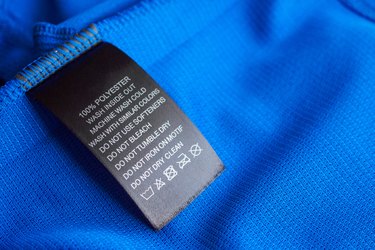
Polyester has graduated from its status as a tacky fabric that doesn't "breathe" to an up-to-date option that mimics textured knits, silky chiffon and enviable prints. Polyester clothes are often less expensive than those made of all-natural fabrics and resist wrinkling, making polyesters a plus for travel. Polyester is still considered a delicate fabric, however, and can age prematurely if not washed properly.
Washing Polyesters by Hand
Video of the Day
Hand washing is a safe bet for any garment labeled "machine" or "hand washable." If the clothing has embellishments, such as lace, sequins or decals, hand washing is also better than using the machine. Use a mild detergent and warm water, and agitate with your hands. Rinse thoroughly, blot out the excess moisture and then lay flat to dry.
Video of the Day
Washing in the Washer
When you're sure that the garment can be machine washed -- such as when it's specified on the label -- still take care. Follow all polyester washing instructions and turn the garment inside out before placing it in the washer. Washing clothing this way, whether polyester or cotton, helps to preserve its colors and patterns.
Polyester is also used for curtains, sheets and other linens. Wash these items separately from other fabrics, and always load the machine to a manageable capacity -- overloading may cause tearing or incomplete washing, especially with the cheap polyester fabric used with some sheets and lightweight curtains. If the fabric seems thin or fragile, use the delicate setting on the washer.
Using the Permanent Press Settings
Most modern washers and dryers have a permanent press setting. In a washer, the warm or permanent press setting sets the water temperature between 85 and 105 degrees Fahrenheit. Use a mild detergent when washing 100 percent polyester fabrics and polyester blends. Never use chlorine bleach; if additional odor or stain removal is needed, use an oxygen bleach product to avoid damaging the fabric.
Place machine-washable polyesters in the dryer after washing. Use the lowest heat or the permanent press setting, which uses a lower temperature and a cool down period of tumbling to avoid heat damage to polyesters and reduce wrinkles. Use dryer balls rather than fabric softener, either liquid or sheets, when drying polyester clothes and bedding.
Considering "Dry Clean" Labels
Garments labeled "dry clean only" are best off going to your local professional establishment. However, if the label says "dry clean," it means that dry cleaning is the preferred method, but it doesn't exclude hand washing. The dry clean recommendation saves manufacturers from liability if something goes wrong when you wash the clothing at home. Before committing to an at-home washing, test an inside edge with water and soap to make sure the color doesn't bleed or stain.
If you're willing to experiment with at-home washing of polyester, hand washing is safest because it minimizes agitation and abuse. The clothing will also spend less time submerged in water. If you do machine wash your garment, go for a warm delicate cycle, turn the item inside out and place it in a mesh bag.
Always lay the garment flat to dry. Even when set on low heat, you risk the dryer shrinking the clothing and it may degrade the fabric more quickly. Keep polyesters out of the sun while air drying. The sun's heat can shrink the fabric and fade its color and patterns.